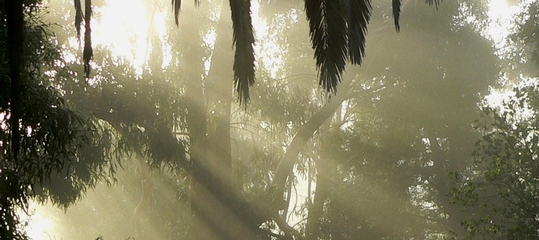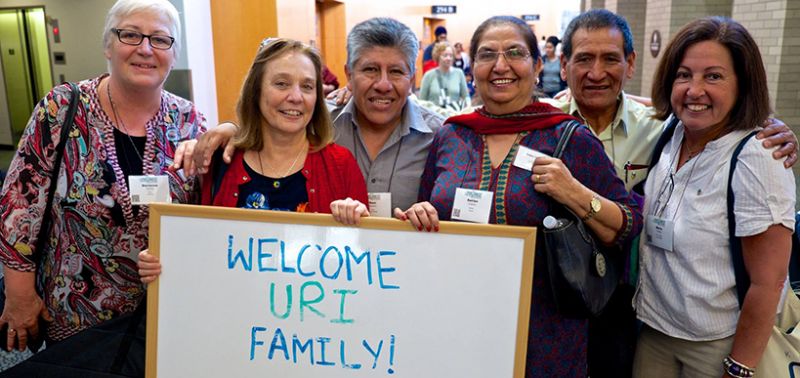'I'd Like To Help":A Conversation With Charles Gibbs
 What can we learn from a pioneer who co-created the largest grassroots interfaith organization in the world? This week's Awakin Call with Charles Gibbs gifted us with answers to this question.
What can we learn from a pioneer who co-created the largest grassroots interfaith organization in the world? This week's Awakin Call with Charles Gibbs gifted us with answers to this question.
Charles Gibbs is an Episcopal priest who, from 1996 until his retirement in 2013, served as the founding executive director of the United Religions Initiative – serving from URI’s gestation to its position as an international network which consists presently of more than 750 cooperation circles (each comprising members of at least 3 faiths or traditions) in 92 countries.
Forging this multinational interfaith organization didn't come without it's challenges, yet all these challenges birthed new connections and understandings that has continued to grow even in the face of divisive events like 9/11. Charles reflects,"I believe that together we created a living antidote to the poison of hatred, division and violence that manifested in those events.”
.jpg)
In dialogue with Charles Gibbs feels like a darshan, a dharma talk, a poetry reading, and a friendly chat all mixed into one. Sprinkled through out are insights and words of wisdom drawn from years of experience and introspection.
We are the Light
One theme that consistently popped up in the conversation is that we are divine. Or as Charles eloquently puts it, we are "made in the image and lightness of God, made in love, and made in light."
This belief in our inner divinity seeps out of everything that Gibbs says. It's in the poem's that Charles chose to share. Whether those be poems he wrote like this one called "The Call of This Moment":
The call of this moment
and all moments
is to seek the light
and to face the darkness
within and without,
with unflinching honesty
and unswerving devotion
to journey at least a little each day
toward enlightenment: living in love --
fearless, joyous and free;
in service to this
glorious and wounded world.
Or poetry he admires like excerpts from Wordsworth "Ode: Intimations of Immortality":
Our birth is but a sleep and a forgetting:
The Soul that rises with us, our life's Star,
Hath had elsewhere its setting,
And cometh from afar:
Not in entire forgetfulness,
And not in utter nakedness,
But trailing clouds of glory do we come
From God, who is our home
With a simplicity that cloaks the depth of the wisdom within, Gibbs sums up this world view in a childhood song:
"...all the theology that I feel I really need is a little song that we learned as children. 'This little light of mine, I am going to let it shine'. I suppose that's been the biggest invitation to me ever since. And to me, that's how we find ourselves and find the source of love and light in this world by seeking the light that's planted within us, and doing what we can to cleanse the things that are blocking that light from shining, to remove the obstacles that keep it from shining in an active way."

This commitment to actively cleansing anything that prevents our light from shining includes unconditionally loving one's self:
"I am not sure that we can love another better than we love ourselves. We can pretend that we do. I think loving ourselves means we are dedicated to realizing the light and love that is within us, and from that love directed inwardly that we can then flow out into the world and do the rest of it."
Everyone is the Light
Once we find the light inside ourselves, our next challenge or opportunity is to spread that light to those around us. Charles speaks about loving those around us including neighbors and strangers. “We are all related; we are family; we are all sisters and brothers to each other. And we are called to be a loving and mutually supportive family.”

This unconditional commitment to see others as part of our family helped Gibbs overcome some fundamental differences between different religious communities when they were creating the United Religions Initiative. While forging the purpose statement, Gibbs and about 30 other religious leaders came to an impasse.
In the circle of sharing about what everyone wanted in the purpose statement, an Anglican Bishop stated, "What's most important for me is that God be in the purpose statement because if God isn't there, as the Bishop, as the person I am, I can't find myself there." While on the other side of the circle, a Buddhist monk from Korea who said, "The most important thing for me in a purpose statement is the God not be there because as a Buddhist, if God is in the purpose statement, I can't find myself there."
After 8 months of working together “with deep reservoirs of mutual affection,” the group came up with this purpose statement: “The purpose of the United Religions Initiatives is to promote enduring daily interfaith cooperations, to end religiously motivated violence, and to create cultures of peace, justice and healing for the earth and all living beings.” The Bishop could find God in that purpose statement, while the Buddhist monk could find not God in that.
Gibbs found that even in the most divisive differences between religions a mutual understanding and love could be found and cultivated. Charles summarizes this unity in a simple statement: “I recognize that before we are unique, we are one.”
With this mindset, Gibbs steps into every interaction with a sense of humility: “in every place in the world, there is insight and wisdom and value in things that are incredibly precious and we need to know about. The only way to do that is to go and engage in a humble way that is open to learning. I carried with me in those years a saying of an anonymous methodist missionary who said ‘Whenever I go into a new place, the first thing I do is to take off my shoes to remind myself that I am standing on holy ground. Otherwise, I might make the mistake of believing that I brought God with me’.”
“I’d Like to Help”
Once we recognize we are all one, the only logical action to take is to help others. Charles expresses this simply in the statement ‘I’d like to help” which is the title of his forthcoming book. In 1993, when the first Bishop William Swing was the Episcopal Bishop of the San Francisco Bay Area, the diocese of California spoke about the invitation from the United Nations that he had received to host a one-hour interfaith service in June of 1995. Charles waited around until everyone and gone and went up to him and said, “I’d like to help.” Out of these simple words grew the United Religions Initiative.

Behind Charles’s words and actions, one can feel a deep commitment to serving others: “This notion that we are here not to serve our own ego needs but to be the service to the broader community.” The others that Gibbs tries to serve includes not only other people, but also nature and the environment. Charles speaks of a value system that stewards those around us and the world at large:
“It's the value system that's grounded in a sense that peace is really the only way to be in this world. We are called to be peaceable beings who help build peace in the world. We are in a world that is a gift to us, so we are to treat that world with reverence and respect, not to wantonly destroy it to meet our own ego needs.”
Although I come from a completely different religious background than Charles Gibbs, his words resonate deep inside my soul to a Truth beyond words. We are the same; we are one. Charles Gibbs has that effect on others. He is a peacemaker beyond words, beyond religions, beyond differences.
Posted by Kozo Hattori on Jan 11, 2016



On Jan 14, 2016 Paul Chaffee wrote:
Post Your Reply